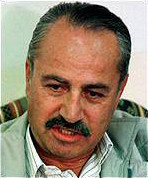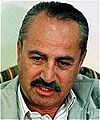Abu Ali Mustafa facts for kids
Quick facts for kids
Abu Ali Mustafa
أبو علي مصطفى |
|
|---|---|
 |
|
| General Secretary of the Popular Front for the Liberation of Palestine | |
| In office July 2000 – 27 August 2001 |
|
| Preceded by | George Habash |
| Succeeded by | Ahmad Sa'adat |
| Personal details | |
| Born |
Mustafa Ali Zabri
14 May 1938 Arraba, Jenin, Mandatory Palestine |
| Died | August 27, 2001 (aged 63) Al-Bireh, Palestine |
| Nationality | Palestinian |
| Political party | Popular Front for the Liberation of Palestine |
| Other political affiliations |
Arab Nationalist Movement (1955–1967) |
Mustafa Ali Zabri (Arabic: مصطفى علي العلي; 1938 – 27 August 2001), known as Abu Ali Mustafa (![]() i/ˈɑːbuː ˈɑːli ˈmuːstəfə/; Arabic: أبو علي مصطفى), was a Palestinian leader. He served as the General Secretary of the Popular Front for the Liberation of Palestine (PFLP) from July 2000 until his death on August 27, 2001. After his death, Ahmad Saadat took over as Secretary General. The PFLP later named its armed group in the Palestinian territories the Abu Ali Mustafa Brigades in his honor.
i/ˈɑːbuː ˈɑːli ˈmuːstəfə/; Arabic: أبو علي مصطفى), was a Palestinian leader. He served as the General Secretary of the Popular Front for the Liberation of Palestine (PFLP) from July 2000 until his death on August 27, 2001. After his death, Ahmad Saadat took over as Secretary General. The PFLP later named its armed group in the Palestinian territories the Abu Ali Mustafa Brigades in his honor.
Contents
About Abu Ali Mustafa
Mustafa Zabri was born in 1938. His hometown was Arrabah, a town in the northern West Bank. His father was a farmer.
Early Life and Political Start
In 1955, when he was 17, Mustafa joined the Arab Nationalist Movement (ANM). Two years later, in 1957, he was arrested by the authorities in Jordan because of his political activities. After he was released in 1961, he became in charge of the ANM's military actions in the northern West Bank.
Following the Six-Day War, when the Israel Defense Forces took control of the West Bank, he left the area. He spent 32 years living mostly in Damascus and Jordan.
Joining the PFLP
In 1967, Mustafa joined George Habash and other members of the ANM. Together, they created the Popular Front for the Liberation of Palestine (PFLP). This new group had a left-wing political view. Mustafa quickly became an important member of the PFLP.
He was also a well-known member of the Palestine Liberation Organisation (PLO). He rose through the ranks to become a member of its main governing group, the Executive Committee. For a long time, he was the deputy leader under George Habash in the PFLP.
Leadership Role
In September 1999, Mustafa returned to the West Bank. This happened because of an agreement between Yasser Arafat and Israel's Prime Minister, Ehud Barak. In July 2000, after George Habash retired, Mustafa was chosen as the new general secretary of the PFLP.
The PFLP is seen as a group that uses violence by Israel and many Western countries.
His Death
Abu Ali Mustafa died on August 27, 2001. He was in his office in Al-Bireh city. Two rockets were fired from Israeli Apache helicopters. The rockets went through his office windows while he was at his desk.
More than 50,000 people attended his funeral to mourn his death.
His Views
Before his death, Mustafa gave an interview to Al Jazeera. He said that the Palestinian people had the right to fight for their cause. He was asked about the danger of being targeted by Israeli forces. He replied that everyone involved in the movement was a target. He said they tried to avoid danger but lived under occupation. He believed they had important work to do and nothing would stop them.
Aftermath
On October 17, 2001, Israeli tourist minister Rehavam Ze'evi was killed. A PFLP member named Hamdi Quran carried out this act. It was done in response to Mustafa's death. Ze'evi had been a strong supporter of Israel's actions against Palestinian groups.
Images for kids
See Also
- Popular Front for the Liberation of Palestine
- George Habash
- Ahmad Sa'adat


